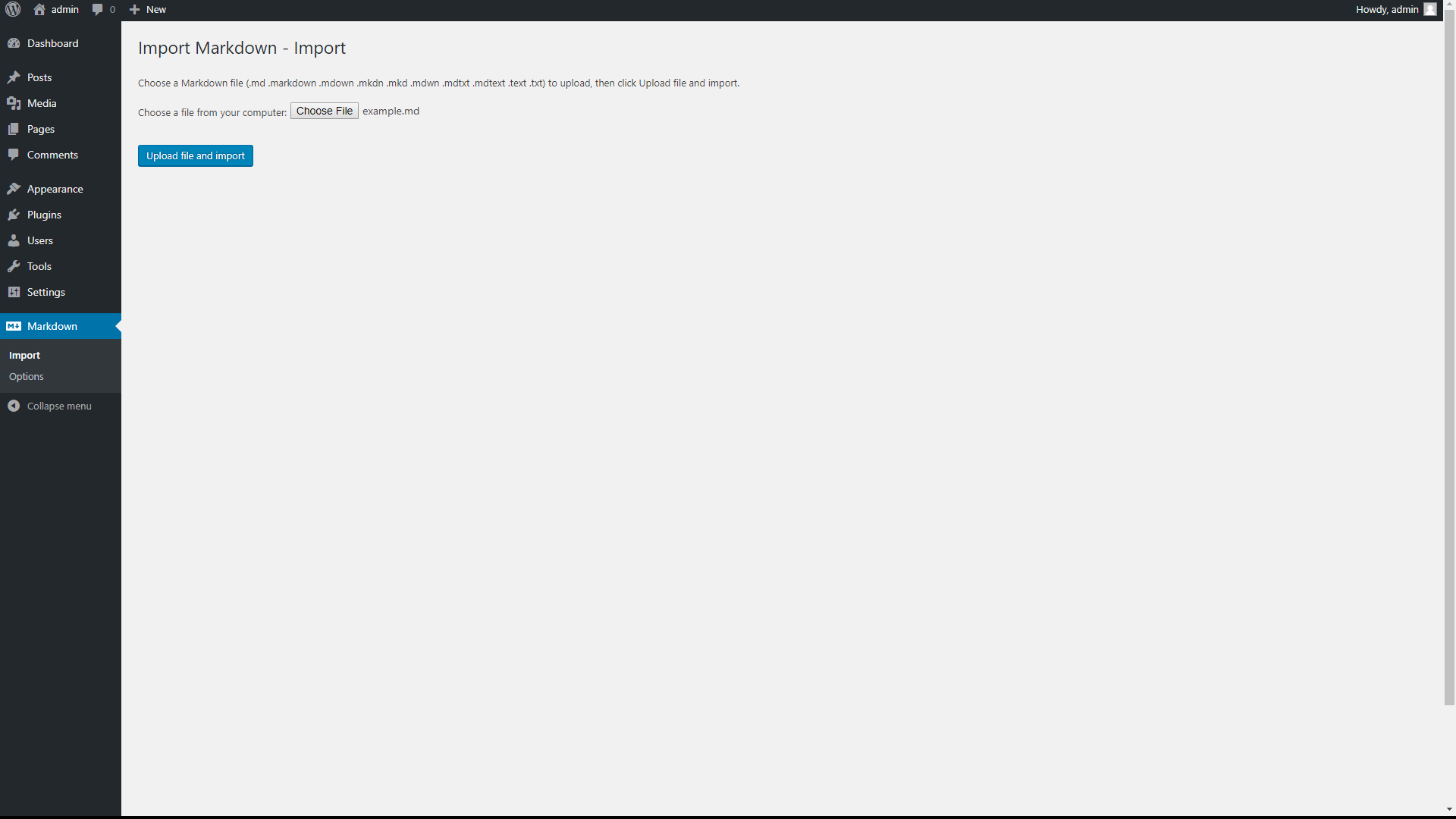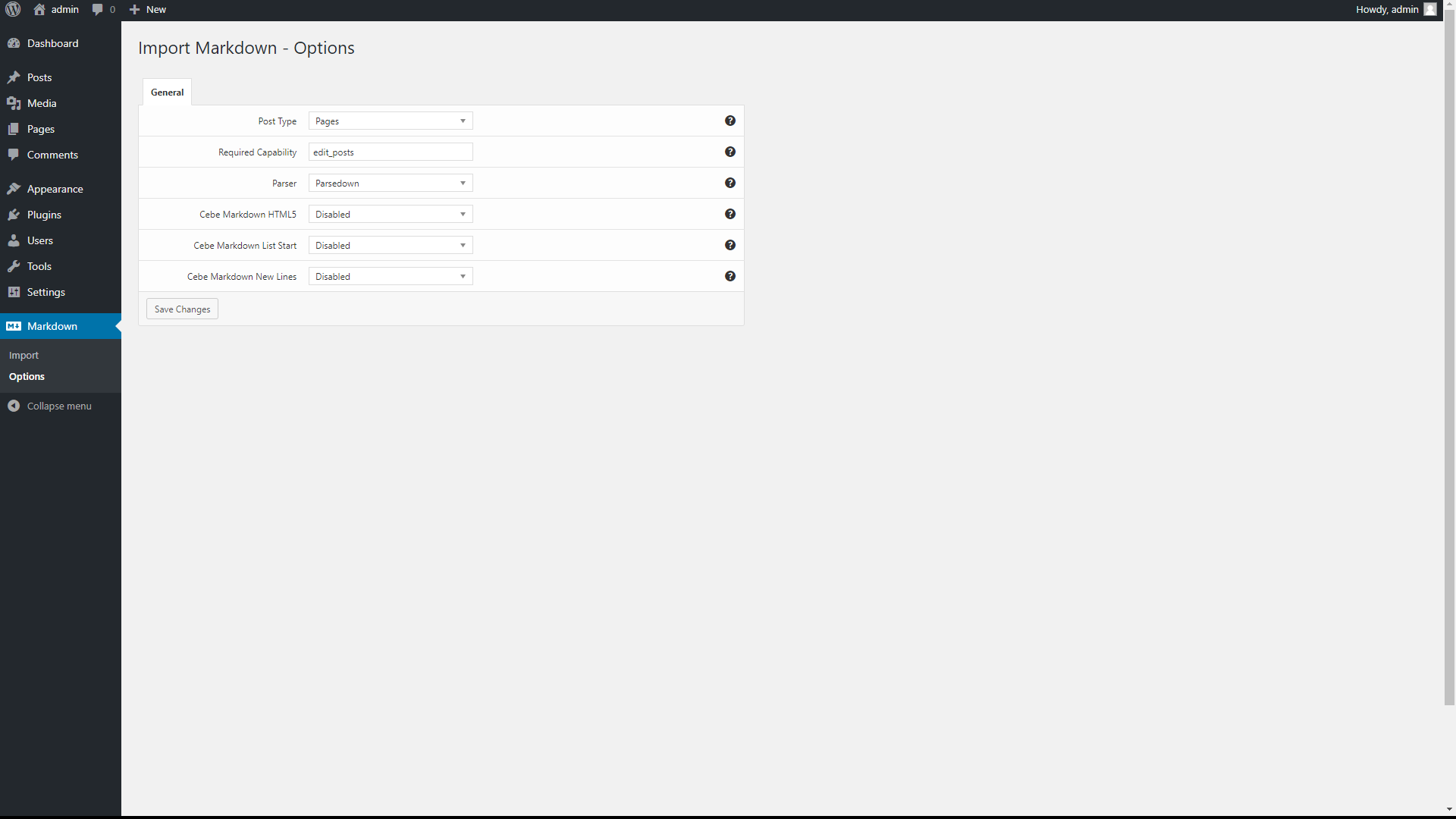
Import Markdown Plugin
Import Markdown lets you easily generates posts based on Markdown files.
Import Markdown lets you easily generates posts based on Markdown files.
Ultimate Markdown
We also run a WordPress plugin that integrates Markdown in the block editor. For more information, check out Ultimate Markdown.
Video Tutorial
Speed up you workflow with Markdown
Markdown is a lightweight and easy-to-use syntax for creating HTML. Let’s see some of the advantages of using this emerging format with the Import Markdown plugin:
- Markdown is extremely easy to use, the tokens available with the Markdown syntax can be learned in less than 30 minutes.
- Markdown translates to perfect HTML. No missing closing tags, no improperly nested tags, no blocks left without containers.
- The Markdown files are simple text files editable with any text or code editor, on any operative system.
- The Markdown files are extremely lightweight text files which don’t need to be compressed to be transported or sent on the internet.
- Writing with the Markdown syntax requires and average of 25% less characters than writing HTML.
- You can stop thinking about html and focus on what’s important, the content.
- You can start writing your posts in your personal distraction free editor, like a simple text/code editor customized for your needs or one of the specific Markdown editors available on the market.
- Programmers no longer need to manually convert to HTML entities the problematic characters present in code snippets. The Markdown parsers do this job for you.
- With five included parser and three Markdown variations supported, this plugin can certainly satisfy even a Markdown expert who make use of any possibility provided by the syntax.
Five Markdown parsers and three markdown flavors
At this time there isn’t a clearly defined Markdown standard and different implementations are currently used on the web. For this reason this plugin doesn’t force you to adopt a specific Markdown syntax, but instead allows you to select your favorite parser between the five available.
In the Import Markdown options you will be able to selected one of these five parser. In this list for each parser you have a reference to the supported syntax.
Parsedown (GitHub)
Parsedown Extra (Extra)
Cebe Markdown (Traditional)
Cebe Markdown GitHub (GitHub)
Cebe Markdown Extra (Extra)
Credits
This plugin make use of the following resources:
- Parsedown licensed under the MIT License
- Cebe Markdown licensed under the MIT License
- Composer licensed under the MIT License
- Chosen licensed under the MIT License
Legal Note
The name “Markdown” is used with the only purpose of making clear to the users the type of syntax supported by this plugin. You should not assume that the original author of the “Markdown” syntax, defined in 2004 with this post, endorses this plugin.
Installation
Installation (Single Site)
With this procedure you will be able to install the Import Markdown plugin on your WordPress website:
- Visit the Plugins -> Add New menu
- Click on the Upload Plugin button and select the zip file you just downloaded
- Click on Install Now
- Click on Activate Plugin
Installation (Multisite)
This plugin supports both a Network Activation (the plugin will be activated on all the sites of your WordPress Network) and a Single Site Activation in a WordPress Network environment (your plugin will be activate on single site of the network).
With this procedure you will be able to perform a Network Activation:
- Visit the Plugins -> Add New menu
- Click on the Upload Plugin button and select the zip file you just downloaded
- Click on Install Now
- Click on Network Activate
With this procedure you will be able to perform a Single Site Activation in a WordPress Network environment:
- Visit the specific site of the WordPress Network where you want to install the plugin
- Visit the Plugins menu
- Click on the Activate button (just below the name of the plugin)
Screenshots
FAQ
- For the basic plugin functionalities PHP 5.3 or higher
- For the Parsedown Parsers PHP 5.3 or higher
- For the Cebe Markdown Parsers 5.4 or higher
The following file extensions are supported:
- .md
- .markdown
- .mdown
- .mkdn
- .mkd
- .mdwn
- .mdtxt
- .mdtext
- .text
- .txt
Changelog
1.11
April 8, 2024
- Fixed a bug (started with WordPress version 6.5) that prevented the creation of the plugin database tables and the initialization of the plugin options during the plugin activation.
1.10
May 26, 2023
- Improved escaping functions.
- Footer text added on all the plugin menus.
- “Text Domain” added in the plugin headers.
- Minor CSS improvements in the back-end menus.
- Changelog added.
1.09
June 13, 2022
- Changed link in readme.txt
1.08
June 13, 2022
- Action link added in the “Plugins” menu.
- Improving UI text.
- New menus added.
1.07
December 28, 2021
- Fixes CSS issues caused by CSS changes applied in WordPress 5.3
- Removed sidebar with the help section and links to other plugins.
1.05
July 5, 2018
- The translation text domain now matches the slug of the plugin.
- Fixed icon.svg background color.
- Added text domain and domain path in plugin metadata.
1.02
July 3, 2018
- Initial release.

